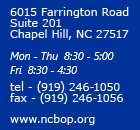Pharmacist FAQsFrequently Asked Questions for Pharmacists on Dispensing Physicians
A. Yes. Physicians contemplating a “dispensing” practice should consult their own counsel regarding at least the following issues: 1. At a recent national meeting, an attorney from a major law firm announced that dispensing physicians faced “myriad potential problems” from federal anti-kickback and Stark laws. The attorney compared dispensing physicians to those who operated laboratories and referred patients to the laboratories for testing. Many physicians faced significant liabilities under anti-kickback and Stark laws as a result. 2. North Carolina law contains a “no self-referral” statute applicable to physicians. Physicians must carefully consider whether a dispensing practice violates this statute. 3. Many companies that market dispensing systems and products to physicians are very likely non-compliant with many North Carolina laws governing the practice of pharmacy. Many such companies are “pre-packaging” prescription drugs and delivering them to physician practices in the state, even though such companies are not themselves permitted by the Board of Pharmacy or by the Department of Agriculture. Such companies likely fit within the definition of a pharmacy in North Carolina – requiring licensure by the Board -- or as a wholesaler or repackager – requiring licensure by the North Carolina Department of Agriculture. Purchasing products from such companies could expose a dispensing physician to significant legal risks. ---------------------------------------------------------------------------------------------------------- Q: The Board gets questions from time to time about dispensing physicians. Do dispensing physicians have to register with the Board and what rules must they follow? A: Physicians who dispense drugs for a fee or other charge (dispensing physicians) must annually register with the Board, NCGS 90-85.21(b), with a fee of $75.00 . This means that physicians who are dispensing only samples and not charging for them do not need to register with the Pharmacy Board. Dispensing physicians should be aware that there is no exemption from the laws and regulations governing Packaging: Labeling: NCGS 106-134.1(b), 90-85.21 Recordkeeping: NCGS 90-85.21(b), 90-85.26, Patient Counseling: 21NCAC 46.2504(a) Prospective DUR : 21NCAC 46.2504(d) (Most of these sections can be found under the Drug Law section of the Board’s website) Failure to comply with these requirements could subject the dispensing physician to discipline by the North Carolina Medical Board. Likely areas for noncompliance include: failure to conduct DUR, delegating dispensing functions to office staff, incomplete labeling, failure to conduct appropriate patient counseling, poor record keeping, and failure to use child resistant containers. Dispensing physicians should be aware that they could face substantial liability if a patient were injured as a result of such non-compliance. The Food and Drug Administration has adopted rules on dispensing of samples with an effective date of December, 2000. Summarized, the statute and regulations in this area specify that it is unlawful to buy, sell or trade or offer to buy, sell or trade samples. Violations can produce a fine of $250,000 and/or ten years in prison or both for first offenders. Prosecutions have occurred under this statute in North Carolina. Dispensing physicians must actually do the dispensing themselves. As discussed above, dispensing physicians must follow all relevant laws and regulations that apply to pharmacists governing dispensing, including packaging, labeling, recordkeeping, patient counseling, and prospective DUR. Controlled substances are a special case and many physicians refrain from dispensing these products. Dispensing physicians need to keep accurate records of receipts, dispensings and inventories at least once every two years in order to comply with federal rules. Most violations are felonies. Finally, dispensing physicians should be aware that referring their Medicare or Medicaid patients to their internal dispensaries could put them at risk of violating Medicare/Medicaid fraud and abuse laws. -------------------------------------------------------------------------------- Q: What is the procedure in North Carolina for physicians when ordering Schedule II, III, and IV drugs for office use? A: The physician needs to complete a Schedule II Order form (DEA 222; see http://www.deadiversion.usdoj.gov/drugreg/change_requests/order_form.htm) for a drug in Schedule II and send it to the supplier which can be a pharmacy. The supplier keeps one copy and send the other copy to DEA. Note the instructions in the margin of the form. Orders for drugs in Schedule III or IV can occur on an invoice and the supplier (pharmacy) keeps these invoices with other CS records noting that these are outgoing items. These transactions should not occur pursuant to a prescription because prescriptions need to be patient specific.
|

